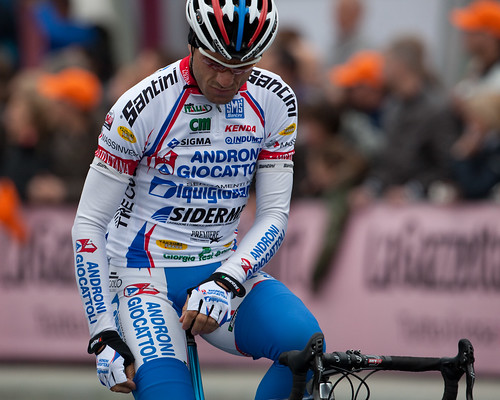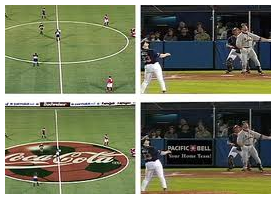American documentary maker Morgan Spurlock has a new film called “Sold Out”. You might know him from the “Supersize Me” film where he tried to stick to a diet of fast food and measured the ill-effects.
His new effort focuses on the omnipresence of advertising and branding in our lives, from billboards to product placement. As you can see from the image above, he’s sold space on his clothing to sponsors and in fact the full name for the film is “Pom Wonderful Presents: The Greatest Movie Ever Sold”.
Yet if Spurlock is employing the classic reductio ad absurdum technique to point out with satire just how much advertising gets beamed at us… doesn’t he just remind you of a pro cyclist posing in front of the team car? What’s normal for us is parody for Spurlock.

Fans of pro cycling have become accustomed to jerseys covered in sponsors, some are so full of logos that you need to be a speed reader to read the names. Teams are themselves named after the sponsor and in some annoying cases there’s even Team X presented by Y. What we take for normal in cycling is close to absurd, even in other sports.
This isn’t to say cycling is unique. Of course other sports realise clothing is valuable advertising “real estate” and talking of real estate, even some sports arenas are named after a corporate partner. It’s just the way cycling sells the space available and even team naming rights, perhaps more than any other sport.
It even reaches the amateur ranks, I remember a joke on twitter from last year – I think from an Australian – that defines a cycling club as “where lawyers, dentists and architects group together to extract money small shopkeepers” because even many small clubs and teams want the pro / Euro look complete with the name of their local café or bike shop.
But despite all this, maybe Spurlock would appreciate pro cycling? His film seems to be a cynical take on marketing techniques but in cycling the commercial aspect is, dare I say it, refreshingly naked. Teams are named after companies and brands: it’s that simple and it’s been that way since the first teams were formed by bicycle manufacturers over a century ago. Ever since it’s up to the team either to win and gain newspaper coverage, or more importantly these days, TV airtime. Failing this, as is often the case in cycling, if you can win then you appeal simply by trying to win. There’s little going on at the subliminal or sneaky level here. Although doping can mean you’re not always watching reality.

By contrast watch a Hollywood film and the actress sipping a soft drink does it just so carefully enough that you can see the brand name; sit down to watch a soccer game and the hoardings around the stadium can display different messages to viewers in different countries thanks to virtual advertising, or flash adverts for beer close to half time when people get thirsty.
Supersize my sponsors
Still, a few teams might want to call Morgan Spurlock and ask for his services to supersize their search for a sponsor. If he’s got his entire film rebranded by corporate partners, it’s a skill some teams are crying out for. For example, unless we’re being kept in the dark ahead of a triumphant announcement in July, HTC is stepping down leaving the apparently mighty Highroad outfit without a sponsor for 2012. How can it be that such a leading team struggles to get backing?


Cycling isn’t alone – a great branding fail all too visibile in this image from the Capitol of Texas Triathlon a few weeks ago…http://ow.ly/i/ch6s
When I went to the Tour of California last year, I was excitedly texting my sister all the teams that were down at breakfast: HTC-Columbia (was that 2010?) to the left, Radioshack behind me, United Healthcare presented by blah-blah in front of me, ad nauseum. She texted back: “Are you at a bike race or a branding convention?” Something like that.
As we’ve seen time and again, having a winning team doesn’t automatically mean success in terms of finding a new sponsor. In some instances, it might actually hurt, by raising the cost of entry for a sponsor.
One problem with many jerseys is that they are over branded; if you can’t easily read the logos, or can’t focus on 1 or 2, it provides almost no benefit. While the “Androni” model mitigates the loss of one sponsor, it also prevents landing the big one.
Why would any international brand with a large marketing budget want to be seen backing cycling at the moment? It’s all about the drugs. Who wants to be linked to a doping scandal?
How about AMGEN, sponsors of the Tour of California/developers of synthetic EPO in the 1980’s?
That virtual advertising is evil. Didn’t even realise they could do that. I think that if certain factions in cycling get their way, advertising & how the sport is marketed will be more important than the sporting aspect. Bill Hicks was right.
At the club level, I was supporting selling-out, until a mate put it into context. Mind you I wasn’t a dentist & could barely afford the race entry each week. I have been eternally grateful to my mate for pointing out the error of my ways. I have met people who will not ride for a club that isn’t sponsored, for the very fact that they don’t think they look “Pro”.
It’s quite sad to see the blatant greed in local sport these days where more often than not people seem to associate being sponsored as being successful without thought to being any good. More worrying is how little clubs are willing to accept as “sponsorship”.
High Road ( HTC Columbia )
was an inherited team (by Stapleton) from the demise of T Mobile – Godefroot-Ludwig.
When T Mobile decided to stop, the contractual obligation sustained the finances for a period,
combined with running two teams (mens + ladies) and the sheer young talent pool the team acquired, ensured that it was without doubt THE emerging team.
Unfortunately, it became a victim of its own success.
When the team riders were winning (as they still do) the agent wage demands went through the financial roof, and as a result they renegotiated with salaries, and lost a few riders, but remained the team which spotted young riders with potential.
The Columbia ‘deal’ – (some will argue was a success, for the brand, but from a long term business option, it was a poor decision) they failed to capitalise on any long term branding.
Google/Skype deal, no idea of the financials, if at all, HTC appears a worthwhile deal, but was it constructed along the same lines as Columbia clothing deal?
Who knows… the tie in with Specialized bicycles & components added value, but they failed again to capitalise.
If Cavendish departs the team, watch the others run…..
If the riders had a union perhaps they too could tap into the TV broadcasting rights… Right now they are pretty much getting ripped off despite looking like moving billboards…
I have no sympathy for the sponsors and they way the system is set up certainly creates immense pressure on the DS and the riders to get results to keep the sponsor — at any cost. This creates a races to the bottom (ethically speaking). The more things change…. they still are the “forcats de la route”
I know from a very mouth of a certain Pro who was caught with a can of Coke in his hand during a stage of the TdF and had a very angry (and costly) “please explain” from his sponsor Gatorade.
Thing is, at the time Coke were sponsoring the Tour so cans were handed to every rider and the one in question reached and grabbed one after just topping a HC climb with the other GC contenders at full race pace. Was, quote “struggling to even see” from the exertion yet was meant to have the presence of mind to think of his contracts before grabbing the first beverage that was thrust his way.
Tough enough gig being a Pro, the marketing just takes it to another level…
It will be a problem when we hear commentators speak of ‘The Bialetti Zoncolan’, or ‘The Evian Galibier’.
I am not to concerned….since we get to watch all of these events for free, and someone has to pay them. In fact, I think this is one of the few sports where I am okay with the marketing efforts. For one thing, this has been the tradition with the sport (unlike efforts in some leagues in the States to try to move towards more of a soccer oriented approach, and put logos on jerseys – think a giant Fidelity logo on the Red Sox uniform, and you get how blasphemous this would be).
However – Flashing Pedals brings up a great point – too many companies sponsor a team, and yet, fail to put together a plan to more fully integrate that sponsorship into their overall marketing/sales strategy. Columbia is a perfect example. Radioshack is actually perfect, since a dying company is sponsoring a soon-to-be defunct team. Perfect fit there. But what about other teams?
Colavita – I often wonder about the Colavita team here in the States. How does an Olive Oil company benefit from the sponsorship in cycling?
Mountain Khakis – seems to me a better sponsorship would have been mountain biking. For one thing, their line of khakis are aimed at a more rustic, tough breed of pants, like something you would wear after a day on the trail.
Skil – Shimano – How does Skil (a saw manufacturer) benefit from a sponsorship of a road cycling team? I understand in Europe the sponsorships can be less cycling specific due to the fact so many non-cyclists watch the sport, but to me, this is the equivalent of PETA sponsoring the Pro Bass Fishing circuit (yes Europe – we in the States actually have a bass fishing tour. I am ashamed to admit this).
Modern sport is now highly professional with corresponding levels of marketing, advertising and branding. Each sport has slightly different advertising and sponsorship streams so not all sports need the competitors to be covered in logos as pro cyclists are. Although F1 drivers look remarkably similar to pro-cyclists when it comes to logos, see this image of Lewis Hamilton.
http://images.wikia.com/pixar/images/2/27/Lewis-Hamilton.jpg
Ironically lots of money from sponsors doesn’t seem to help some sports. Chelsea FC has lost about £500 million under Abramovich. Despite Premier League Football being the most luctractive sport in Europe with a huge income from TV rights, full stadiums, and merchandising. Many other clubs are in a similar predictament, relying on an extremely wealthy benefactor pumping ever increasing amounts into their club in order to buy success. At what point does this bubble burst?
Maybe cycling, although a poorer sport than football, is not in such a bad state after all.